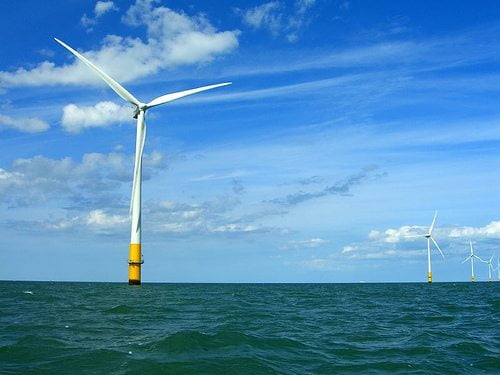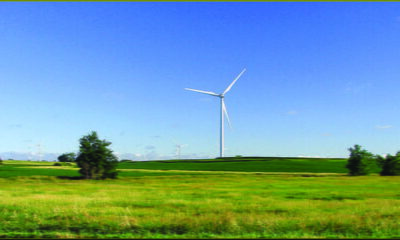

Energy
Galloper wind farm first UK project backed by EUR 315 billion Investment Plan for Europe
The European Investment Bank, Europe’s long-term investment institution, has agreed to provide GBP 225 million for the Galloper Wind Farm Ltd (GWFL) to be constructed 27 km off the Suffolk Coast. Once operational the offshore wind farm will be capable of providing enough clean energy to supply up to 336,000 homes from the world’s largest wind turbines. The project also represents the UK’s first pre-construction offshore wind project finance deal.
This is the first UK project to be backed by the European Fund for Strategic Investments (EFSI), the heart of the Investment Plan for Europe. EFSI was established earlier this year by the European Investment Bank and the European Commission and will enable increased lending and attract private capital for crucial projects by the European Investment Bank in strategic sectors such as renewable energy, digital infrastructure, transport and R&D, as well as financing for SMEs.
The UK Green Investment Bank plc (GIB) has joined Siemens Financial Services, Macquarie Capital and project developer RWE Innogy as 25% joint equity partners in the £1.5bn Galloper offshore wind farm. This is GIB’s eighth investment in the UK’s offshore wind sector. The GIB has helped mobilise more than £5bn in cumulative capital for offshore wind projects in the UK that, once operational, will provide nearly 3,000 MW of renewable electricity generation capacity – enough to power more than 2.3 million homes in the UK.
“The Galloper wind farm is the first UK project to be directly supported by the EFSI initiative. This reflects both the quality of EFSI projects and the strong green focus of the EUR 315 billion investment scheme. Projects such as Galloper demonstrate the leading role of the European offshore sector and confirm the EIB’s commitment to finance investment in green growth. We are pleased to have worked with a world-class sponsor group including Green Investment Bank, and alongside a group of leading project finance banks, to ensure that Galloper could be financed in record time.” said Jonathan Taylor, European Investment Bank Vice President.
Jyrki Katainen, Vice-President of the European Commission, and responsible for Jobs, Growth, Investment and Competitiveness, said: “The Galloper project will help households and businesses across the UK access cleaner, renewable energy. At the same time, the construction of the wind farm will generate hundreds of jobs. This project is innovative and ambitious, and it is a great example of why the Investment Plan was created. I hope other project promoters across the EU hearing this news are now inspired to contact the EIB with their proposals.”
Hans Bünting, CEO of RWE Innogy the company leading the construction of the project on behalf of GWFL said: “Today’s announcement is the culmination of many months of successful negotiations with our partners, and investors including the European Investment Bank, and shows that the UK is still a strong market for offshore renewables. I look forward to working together with our new partners to utilise our collective experience and expertise to realise the successful construction of Galloper wind farm.”
Ed Northam, Head of Investment Banking, UK Green Investment Bank, said: “This is another significant milestone in the development of the UK offshore wind industry in a year that has already seen two major projects come online and construction commence on another. The transaction reinforces our relationship with RWE and further highlights the impressive list of companies that are investing in the sector. It is the second investment in offshore wind that GIB has made at FID in the space of six months, demonstrating the role that we continue to play in making sure that complex, but important, green infrastructure projects can proceed.”
RenewableUK’s Director of Policy for Economics and Regulation, Dr Gordon Edge, said “The UK is the number one destination for offshore wind investors. This week’s two major announcements of offshore wind projects achieving financial close, securing billions of pounds in investment, show that it remains an attractive place to do offshore business.
“The Government’s advisory body, the Committee on Climate Change, is now recommending we install 1-2 gigawatts of offshore wind a year throughout the 2020s to meet out carbon reduction goals, so we could reach as much as 30GW by 2030. The CCC says offshore wind is set to become cheaper than gas during the next decade, so it offers excellent value for money in terms of keeping bills down. We’re also generating jobs, with 13,000 people already working in the industry – that could increase to 44,000 in less than 10 years.
“However, if we’re to continue to deliver ambitious offshore infrastructure projects throughout the 2020s, we need a clear plan from Government stating how much offshore wind capacity it wants over the next decade. We’ve had some encouraging signals so far, but we need details of how the financial framework is going to work for offshore wind to deliver at scale, as a key part of the Government’s industrial strategy.”
The £1.5 billion UK renewable energy project is set to create over 700 jobs during construction and nearly a hundred once operational. Already more than GBP 150 million has been spent during development of the scheme and once operational Galloper will use 56 six megawatt turbines.
The European Investment Bank is supporting the Galloper project alongside a consortium of 12 commercial banks.
Over the last 5 years the European Investment Bank has provided more than EUR 5 billion for investment in offshore wind farms in the North Sea off the UK, Belgian, Dutch and German coasts, as well as offshore transmission links to connect offshore windfarms to national electricity networks.


 Environment12 months ago
Environment12 months agoAre Polymer Banknotes: an Eco-Friendly Trend or a Groundswell?

 Features11 months ago
Features11 months agoEco-Friendly Cryptocurrencies: Sustainable Investment Choices

 Features12 months ago
Features12 months agoEco-Friendly Crypto Traders Must Find the Right Exchange

 Energy11 months ago
Energy11 months agoThe Growing Role of Solar Panels in Ireland’s Energy Future























